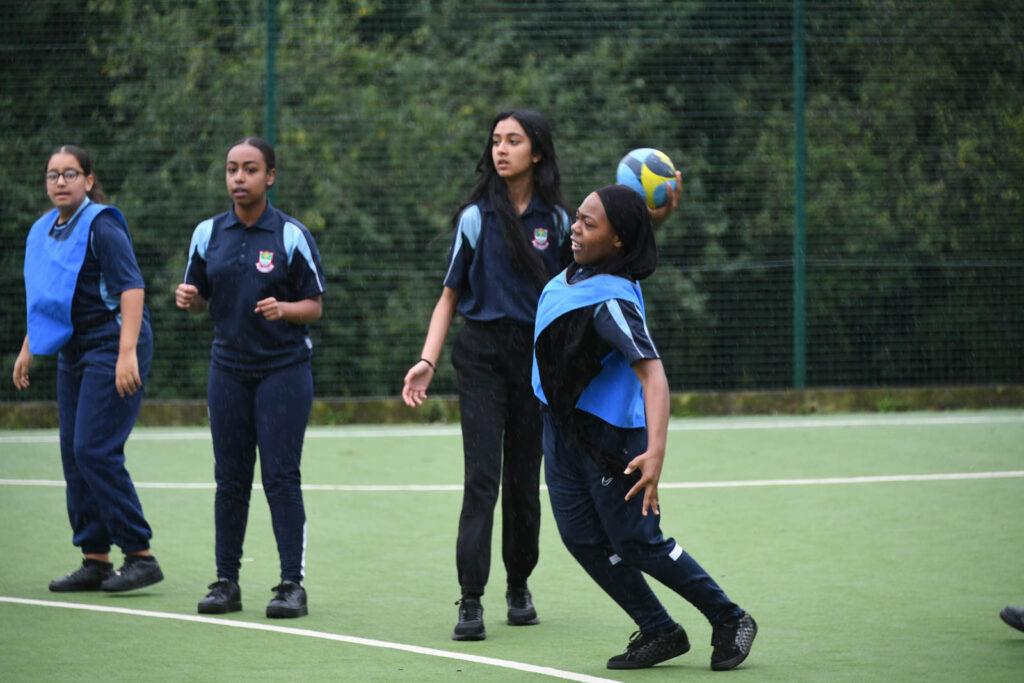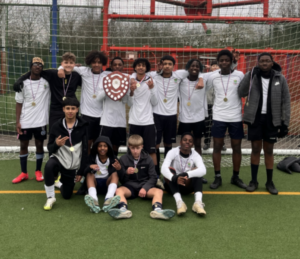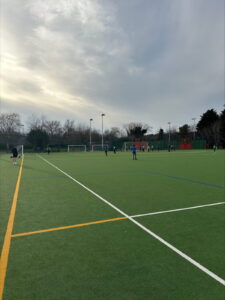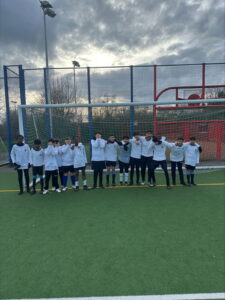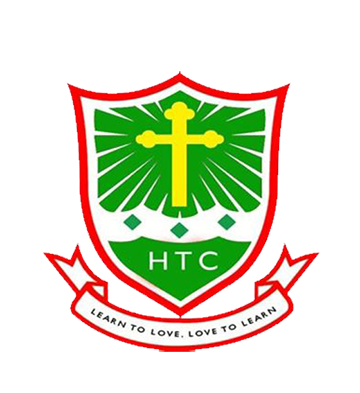Physical Education department
Curriculum Intent
The Physical Education department at Holy Trinity aim to ensure our students develop in a broad range of activities. We teach our students to be generous and grateful with their god given talents and allow them to have opportunities to engage in both performance activities and competitive sports. We teach our students the importance of taking part in regular physical activity and its impact on being able to lead a healthy life.
We provide our students with a rich curriculum that allows students to excel, be creative and competitive. Students take part in Physical Education throughout KS3 and KS4, with additional lessons for those students who choose to take GCSE Physical education or Cambridge National Sport Studies
Our Physical Education curriculum aim to ensure that all pupils:
- develop competence to excel in a broad range of physical activities
- are physically active for sustained periods of time
- engage in competitive sports and activities
- lead healthy, active lives
"Sports do not develop character, they reveal it" - John Wooden
Staff
Head of Boys PE and Duke of Edinburgh lead – Mr Garrison
Head of Girls PE – Mrs John
PE Teacher (Behaviour lead) – Miss Backhouse
PE Teacher (2nd in Dept and Primary School outreach) – Mr Hawkeswood
PE Teacher – Mrs Khan
KS3 and KS4 Core PE
Within KS3 students have two PE lessons a week, in KS4 students take part in one lesson per week, where they can take part in a variety of activities including both team sport and individual sports on a 4-6 weekly rotation. Within these lessons students develop a wide range of skills which are developed through years 7 – 11.
Our teachers ensure that all students:
- develop competence to excel in a broad range of physical activities
- are physically active for sustained periods of time
- engage in competitive sports and activities
- lead healthy, active lives
GCSE Physical Education
Students who choose to take examination PE and KS4 will have additional GCSE PE lessons as well as their core PE lesson. The curriculum provides students with a mixture of practical and academic skills.
Our GCSE curriculum equips students with the knowledge, understanding, skills and values to develop and maintain their performance in physical activities and understand the benefits to health, fitness and well-being.
We aim to:
- develop theoretical knowledge and understanding of the factors that underpin physical activity and sport and use this knowledge to improve performance
- understand how the physiological and psychological state affects performance in physical activity and sport
- perform effectively in different physical activities by developing skills and techniques and selecting and using tactics, strategies and/or compositional ideas
- develop their ability to analyse and evaluate to improve performance in physical activity and sport
- understand the contribution which physical activity and sport make to health, fitness and well-being
- understand key socio-cultural influences which can affect people’s involvement in physical activity and sport
Cambridge National Sport Studies
Students will take part in additional Sport Studies lessons, as well as their core PE lessons. Sport Studies provides students with a broad knowledge and understanding of different aspects of sports studies, from looking at contemporary issues in sport and the relationship between sport and the media to developing the practical skills essential for progression into the sports industry.
Our curriculum enables students to develop and apply knowledge of sports-related activities, with a particular focus on officiating. Students will explore contemporary issues in sport, different ways of being involved in the sports industry, and the impact of sport on wider society.
We aim to:
- develop a range of skills through involvement in sport and physical activity in different contexts and roles
- develop their ability to apply theoretical knowledge to practical situations
- gain a better understanding of the complexity of different areas of sport and the sports industry
- increase their awareness of different ways to stay involved in sport and physical activity and of different careers and roles within sport
KS3 Curriculum overview
By the end of each key stage, pupils are expected to know, apply and understand the matters, skills and processes specified in the relevant programme of study.
Over the course of the year students will participate in the following activities:
Year | Boys | Girls |
7 | Rugby Union Hockey Netball Basketball Table tennis Fitness Gymnastics Athletics Cricket Rounders Ultimate Frisbee | Netball Basketball Gymnastics Dance Fitness Handball Rounders Tennis Athletics Cricket |
8 | Rugby Union Hockey Netball Basketball Table tennis Fitness Gymnastics Athletics Cricket Rounders Ultimate Frisbee | Netball Basketball Gymnastics Trampolining Dance Fitness Handball Rounders Athletics Cricket Netball Volleyball |
9 | Rugby Union Hockey Netball Basketball Table tennis Fitness Gymnastics Athletics Cricket Rounder Ultimate Frisbee | Netball Basketball Gymnastics Trampolining Dance Fitness Handball Rounders Athletics Cricket Volleyball
|
KS4 Curriculum overview
Boys | Girls |
Football Basketball Hockey Table tennis Fitness Athletics Cricket Tennis | Netball Basketball Dance Fitness Handball Volleyball Rounders Athletics Cricket |
Assessment
KS3 & 4 Core – Students are assessed at the end of each activity using a grading criteria linked to the GCSE specification.
The course:
PE GCSE – OCR specification
Content overview | Assessment overview | |
Applied anatomy and physiology Physical training | Physical factors affecting performance 60 marks 1 hour written paper
| 30% of total GCSE |
Socio-cultural influences Sports psychology Health, fitness and well-being | Socio-cultural issues and sports psychology 60 marks 1 hour written paper
| 30% of total GCSE |
Practical activity assessment Analysing and evaluating performance | Performance in physical education 80 marks Non-exam assessment
| 40% of total GCSE |
OCR Cambridge Nationals – Sport Studies
Sports Studies Units
| Assessment methods |
Mandatory | |
R184 – Contemporary issues in sport
| Written paper OCR set and marked 1 hour 15 minutes – 70 marks Learners answer all questions |
R185: Performance and leadership in sports activities | Centre assessed tasks OCR moderated 80 marks |
Optional | |
R186: Sport and the media | Centre assessed tasks OCR moderated 40 marks |
R187: Increasing awareness of outdoor and adventurous activities | Centre assessed tasks OCR moderated 40 marks |
Websites/ Useful Links
Catholic Social Teaching in Physical education
Human dignity
We teach students to show respect to others regardless of their religion, culture, nationality, and economic standing. students are encouraged to show sportsmanship when competing in team or individual activities. When taking part in activities such as gymnastics and dance students are encouraged to work collaboratively and use teamwork to express their ideas and talents. The curriculum is designed to be inclusive for all and all extra curriculum clubs are open to all students. All students are taught that all are equal and sport is used as a tool to bring people together regardless of what their background is.
Common good
Within the PE curriculum we explore a variety of activities, so that all have the opportunity to be involved. Students are encouraged to express their creations in activities such as leadership, dance and outdoor and adventurous activities and gymnastics.
Stewardship
Sports studies and GCSE-hosting go events – positive and negative effects on earth (countries). Fund raising to help the less fortunate in sport.
Generous and grateful – year 11’s donating their old PE kit when they leave, to help the less fortunate. other students leaving PE kit that is too small, as spare or donated kit for others.
Participation
We have an inclusive curriculum where everyone has the right to participate. We are all equally encouraged to take part regardless of ability, background or religion.
Distributive justice
Within our department we allow inclusivity by having a PE kit that all studnts should wear. this allows all students to be the same. If students are having difficulty with purchasing kit, we give them kit for them to keep.
Fund raising/proving opportunities for all, an example of this was when Marcus Rashford started a campaign to get all children free meals and this is an example of a positive role model, influencing others for the common good.
Subsiding trips – Dofe/ residentials/ coaching qualifications – allow students to gain lifelong skills, character building and a qualification which without the subsidised cost, would not be achievable.
Subsidiarity
This is demonstrated throughout sport when sports people come together and give resources to the ones that require them. Some examples are Sadio Mane building schools, hospitals and houses in Africa or Soccer aid raising money for the poor or campaigns such as kick it out in football.
Solidarity
In PE students are taught to work as team and when competing against other schools/teams, they are taught to demonstrate solidarity through their relationships with others and help each other in times of need.
Promoting Peace
All students in PE will be taught the act of promoting peace throughout their time in and out of school. They are taught to respect each other and others from different walks of life. Promoting peace is a way of making sure all and everyone is equal.
Latest sports news
Well done to your year 10 team who were confirmed league champions after Mondays 5-2 win over Starbank. Throughout the season they have scored 62, only conceded 3 and won...Read More
Well done to our Year 10 team who are now through to the final of the cup after beating Yardley 10-0. Bilal and Tayyab each scored a hat-trick and Anas...Read More
Well done to the year 8 football team who have now made it 3 wins out of 3 this season with a 4-1 win over Small Heath. Mubarak and Esai...Read More

